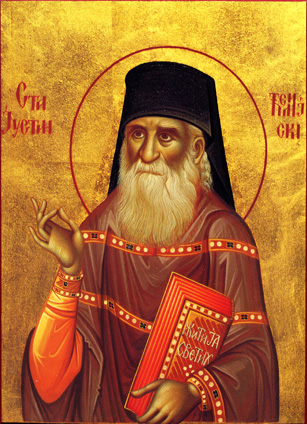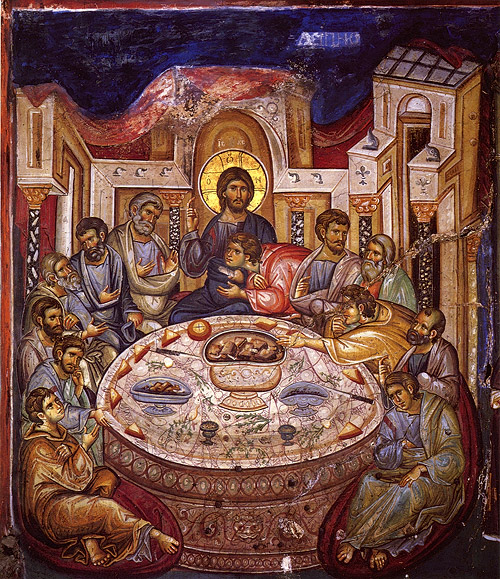A Paschal Homily of Blessed Justin of Chelije
Sentenced to Immortality
 Man sentenced God to death; by His Resurrection, He sentenced man to immortality. In return for a beating, He gives an embrace; for abuse, a blessing; for death, immortality. Man never showed so much hate for God as when he crucified Him; and God never showed more love for man than when He arose. Man even wanted to reduce God to a mortal, but God by His Resurrection made man immortal. The crucified God is Risen and has killed death. Death is no more. Immortality has surrounded man and all the world.
Man sentenced God to death; by His Resurrection, He sentenced man to immortality. In return for a beating, He gives an embrace; for abuse, a blessing; for death, immortality. Man never showed so much hate for God as when he crucified Him; and God never showed more love for man than when He arose. Man even wanted to reduce God to a mortal, but God by His Resurrection made man immortal. The crucified God is Risen and has killed death. Death is no more. Immortality has surrounded man and all the world.
By the Resurrection of the God-Man, human nature has been led irreversibly onto the path of immortality, and has become dreadful to death itself. For before the Resurrection of Christ, death was dreadful to man, but after the Resurrection of Christ, man has become more dreadful to death. When man lives by faith in the Risen God-Man, he lives above death, out of its reach; it is a footstool for his feet:
Paschal Message of Patriarch Kirill of Moscow and All Russia
Paschal Message of Patriarch KIRILL of Moscow and All Russia to the Archpastors, Pastors, Deacons, Monastics and All the Faithful Children of the Russian Orthodox Church
Your Graces the archpastors, venerable fathers, all-honourable monks and nuns, dear brothers and sisters:
Great and Holy Friday
On Great and Holy Friday, Christ died on the Cross. He gave up His spirit with the words: “It is finished” (John 19:30). These words are better understood when rendered: “It is consummated.” He had accomplished the work for which His heavenly Father had sent Him into the world. He became a man in the fullest sense of the word. He accepted the baptism of repentance from John in the Jordan River. He assumed the whole human condition, experiencing all its alienation, agony, and suffering, concluding with the lowly death on the Cross. He perfectly fulfilled the prophecy of Isaiah:
“Therefore I will divide him a portion with the great, and he shall divide the spoil with the strong; because he has poured out his soul to death, and was numbered with the transgressors; yet he bore the sins of many, and made intercession for the transgressors.”
Holy and Great Friday
It was the sight we now commemorate in the present Church service, and behold in the sacred Image before our eyes. The sight was the Son of God, Who came down from the heavens, became man for the salvation of the human race, and was mocked and scourged by men.
What feeling, if not that of horror, should wholly envelope the heart at this sight? What state, if not a state of absolute bewilderment, should be our state of mind? What word could be pronounced at this sight? Does not every human word die upon the lips, before it can even proceed from the lips?
All those who came to this sight, beholding the things which were done, smote their breasts, and returned.
Holy and Great Thursday
Commemoration of the Mystical (Last) Supper
And as they were eating, Jesus took bread, and blessed it, and brake it, and gave it to the disciples, and said, Take, eat; this is my body. And he took the cup, and gave thanks, and gave it to them, saying, Drink ye all of it; For this is my blood of the new testament, which is shed for many for the remission of sins.
Mt. 26:26–28
 The Mystical (Last) Supper. Fresco, Catholicon of Vatopedi Monastery, Mt. Athos. 1312.
The Mystical (Last) Supper. Fresco, Catholicon of Vatopedi Monastery, Mt. Athos. 1312.On the day of the feast of unleavened bread, when according to the Law of the Old Testament a lamb was to be slaughtered and eaten, the hour was come that the Savior should depart out of this world unto the Father (cf. Jn. 13:1). Having come to fulfill the law, Jesus Christ sent His disciples, Peter and John, to Jerusalem to prepare the Passover, which, as the shadow of the law, He wanted to exchange it with the New Pascha—His own Body and Blood. When evening had come, the Lord came with His twelve disciples to a large, prepared upper room of a man who lived in Jerusalem (cf. Mk. 14:12–17) and reclined there. Telling them that the Kingdom of God, which is not of this world, and not earthly greatness and glory, but love, humility, and purity of spirit is what distinguishes its members, the Lord rose from the table and washed the feet of His disciples. Having washed the feet and again reclined, the Lord said to His disciples: Do you know what I have done for you? You call Me Teacher and Lord, and you say correctly, for I am exactly that. Thus, if I, your Lord and Teacher, have washed your feet, then you should wash each others’ feet. For I have given you an example, so that you would do the same thing I have done for you.






